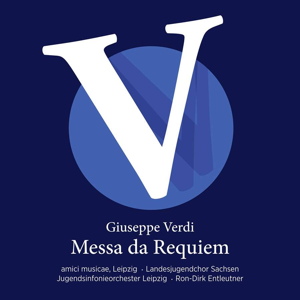
Giuseppe Verdi (1813-1901)
Messa da Requiem
Viktorija Kaminskaite (soprano)
Marie Henriette Reinhold (mezzo-soprano)
André Khamasmie (tenor)
Wolf Matthias Friedrich (bass)
Leipziger Universitätschor
Mendelssohnorchester/David Timm
rec. live, 24 November 2018, Thomaskirche, Leipzig
Rondeau ROP6196 [78]
It would be dishonest of me not to confess that the idea of an historically informed performance of Verdi’s Requiem set my teeth on edge before I had heard a note, but I determined to quash that prejudice, bearing in mind that as the author of two fairly extensive surveys of this work – 29 stereo recordings (survey) and 31 in mono (survey) – I need to challenge the fact that I have become habituated to, if not imprinted with, performances on modern instruments.
Nonetheless, within a minute of first playing this latest release, I was not beguiled by the dull, whining string sound and the clumsily pronounced Latin from underpowered female and immature male voices sounding more like a school choir than a university chorus, let alone a professional outfit. Enter the tenor – oh dear; enter the bass – oh my goodness, even worse; enter the soprano – so-so, but hardly arresting; enter the mezzo – again, not too bad until she gets to her sixth note, an E which she decides not to sound at all but kind of mark; then the school choir chimes in again, channelling Gounod’s angels but emphatically not a band of abject sinners begging for mercy. The tenor then decides to borrow the mezzo’s trick and just mark his top G-flats on Kyrie at 6:07 and by the end of the first movement, less than eight minutes into this enterprise, I had had quite enough.
However, conscience-stricken and burdened by duty, I persevered into the Dies irae – and, mirabile dictu, it was really quite good. This was a live performance; had someone sprinkled fairy dust around St Thomas’ Church? And the Last Trump, while hardly blood-curdling, then goes rather well, too – a few quasi-blatts from the trumpets notwithstanding; the choir finds some venom and the fabled ophicleide, researched and resurrected for this occasion, lends real heft to the bass line. Unfortunately, that heralds the return of the bass who barks out the text in the hammiest manner imaginable, has difficulty singing any of his notes in tune or without wobbling, and runs out of breath long before most of his phrases are meant to end. The mezzo-soprano in “Liber scriptus” has two or three good notes in the middle of her voice but no discernible lower register, and is prone to more drop-outs. She flutters or screams her top notes, and the soprano picks up in much the same vein with “Quid sum miser”. Strange bulges and imbalances among the three voices blight the ensuing trio but those three singers are as celestial archangels hymning souls to heavenly rest compared with the damage the bass can do to a vocal line. Having said that, the soprano’s B-flats exactly twenty minutes into the Dies irae at “donum fac” and again at 20:24 are collector’s items – for all the wrong reasons…
You must by now be able to speculate how much I was looking forward to hearing the tenor’s Ingemisco – and it does not disappoint. It is complete with ferociously spat-out consonants, a wobble which induces instant mal de mer on the part of the listener, and disappearing acuti. Let me put it this way: the reputations of Pavarotti and Björling are safe. I would like to say that the bass’s Confutatis is every bit as good – but it isn’t. I have honestly never heard anything like it. For the first time in many years of reviewing I was strongly tempted not to listen to the remainder of the performance but, from a sense of obligation I did so; sadly, I detected no significant improvement. Following the bass’s groaned “Ne cadant”, the soprano’s supposedly ethereal entry on a sliver of tone on E is not a success and the bass indulges in more gulping and gasping on “In lucem sanctam”.
It is hard to concentrate on the quality of conducting when the standard of solo singing is so abysmal but insofar as I can judge, tempi are very good and phrasing is pleasing; I think Mr Timms could do well with a better team. Little things like the instrumental coda to the Offertorio remind me that some able, talented musicians are involved here. The Sanctus is rather slow and cautious but Timms keeps his choir together; likewise, the choral contribution to the Agnus Dei is respectable and the two lady soloists are heard to their best advantage in this simpler, easier music. The bass undermines what little appeal lies in the Lux aeterna. The concluding Libera me actually goes as well as any of the preceding movements; the timpani, struck with authentic “soft-felt mallets”, make quite an impact, the choir is energised. Although Ms Kaminskaite is harsh-toned, for a while she negotiates her high-flying part almost capably – but is wholly undone at 7:37, when she prepares for the high B-flat with a gasping intake of breath then squawks it flat. At no point here does this performance rise to a truly professional level.
I do not think I have ever written so negative a review, and it gives me little pleasure to sound so mean-spirited. If this were a private recording of an amateur performance, it would perhaps pass as a memento for fond friends and relations, but as a commercial release made under the auspices of Leipzig University, it does that august establishment little credit.
Ralph Moore
Help us financially by purchasing from




















